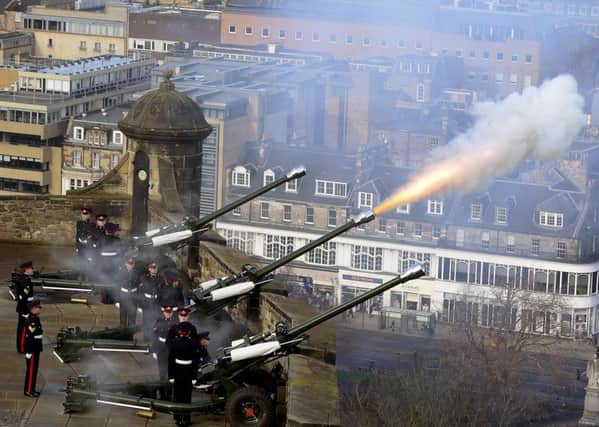Armed Forces reservists deserve a 21-gun salute – Dr Catherine Calderwood


One of the great privileges of the role of Chief Medical Officer is the many and varied opportunities to do unusual things and meet interesting people.
On Easter Monday, I was the reviewing officer for the 21-gun salute given from Edinburgh Castle esplanade to mark Her Majesty the Queen’s 93rd birthday.
Advertisement
Hide AdAdvertisement
Hide AdBeing Easter Monday, there were hundreds of tourists spectating – who had absolutely no idea who I was! – a military pipe band and the weather was beautiful.
Those marching in line and firing the guns? They were all army reservists who volunteer their time in the Lowlands.
I met a plumber, a bricklayer, two landscape gardeners – the boss and his apprentice – and an IT consultant. All were proud to be there and doing something other than the day job but prepared to be deployed if required.
Those playing the pipes – more army reservists, including a biology student, a music teacher and a civil servant – all said how much they enjoyed the team working and camaraderie.
Of course, this is not my only experience of army reserves. I was made Honorary Colonel of 205 (Scottish) Field Hospital two years ago. The field hospital is 178 NHS staff trained to provide intensive care literally in a tent in a field in a battle situation.
There are orthopaedic surgeons, trauma surgeons, burns specialists, ICU nurses, theatre staff, midwives, physiotherapists, radiographers and healthcare assistants who come together from all over Scotland to work as a team.
They have been deployed twice in the last ten years – to Afghanistan and Iran – as there are no longer enough army clinical staff to provide the healthcare required in war and our Armed Forces rely on the reservists who can be deployed for up to six months.
There are ten Field Hospitals in the UK, two of which are always ‘battle ready’ in a five-year cycle. The 205 will complete their final training for duty next month in Germany – and as their ‘turn’ comes closer, the frequency and intensity of the training increases.
Advertisement
Hide AdAdvertisement
Hide AdIn Scotland (but not in England), armed forces reservists are given leave days to complete their training. The tension of course exists – how could it not? – between needing to cover their roles at home and the valuable and necessary service they provide.
The sense of team working is extraordinary – imagine operating in basic conditions with limited equipment (and in a tent), working with people from hospitals all across the country, all of whom usually work in many and varying ways.
There is no choice of individual operating equipment here – there is one set of kit and you get on with the job.
This, of course, means that there are diverse skills brought back in to NHS Scotland – the ability to flex and adapt practice, to work together when resources are scarce, to save lives in unimaginable circumstances. Some of their stories are hard to hear.
An annual recruitment drive is done – which I attend and NHS staff are offered the opportunity for a team-building day and training in a mock battle situation. Over beer and curry afterwards many new reflections on working together at articulated – not many work colleagues drag each other fully clothed out of a swimming pool into a life raft!
Dr Catherine Calderwood is Scotland’s Chief Medical Officer